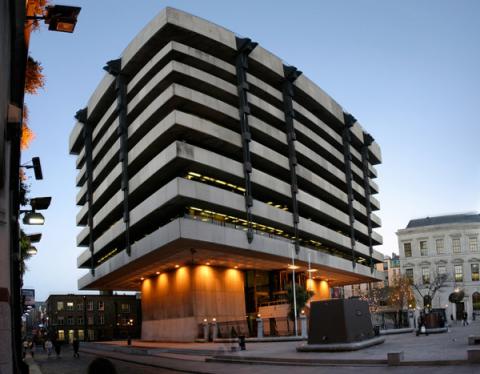Irish banks exclude Muslim borrowers

A lack of Sha'ria-compliant finance products in Ireland prevents equal funding access by the country's 50,000-strong Muslim population. By Sandy Hazel.
The lack of access to suitable finance arrangements for Ireland's Muslim community was highlighted at a global summit on entrepreneurship in Dublin on 27 April, at which US President Barack Obama spoke via webcast. President Obama called for more economic engagement with the Muslim community globally, but admitted that sourcing finance is still a “challenge”.
(Pictured: Central Bank)
Building on his ‘Cairo Objective’ to bridge Muslim and western communities, Obama said that entrepreneurship is the right place to start “…because throughout history, the market has been the most powerful force the world has ever known in creating opportunity and lifting people out of poverty”.
Through this Summit on Entrepreneurship, Obama and his State Department "seek to deepen ties between business leaders, foundations, and entrepreneurs in the United States and Muslim communities around the world".
Hilary Clinton also told the worldwide gathering of Muslim business leaders and entrepreneurship experts that minority entrepreneurship was “an issue whose time has come”. The summit was webcast live in Dublin with international gatherings hosted in embassies around the world.
The Irish Muslim population is put at around 50,000, a significant potential market according to some analysts, yet it is largely ignored by Irish banking institutions. Islam prohibits usury, the profit by interest, and so Muslims in Ireland are prevented from holding mortgages and traditional borrowing for business finance.
Islamic-compliant finance, arranged legally so the bank and client operate a leaseback situation, are available throughout the world, but not in Ireland. A Muslim wanting to start a business in Ireland does not have access to Sha’ria compliant funding.
Some business start ups go north of the border for finance to banks offering Sha’ria products. “Even though banks here in Ireland have been lobbied on this issue, they say it is not a priority for them,” said Ali Selim, an administrator with the Clonskeagh Mosque in Dublin. "Ironically, the Bank of Ireland in the UK offer Sha’ria finance,”said Selim.
“Our communities do not buy houses unless they have saved the cash,” Selim said in an interview with Politico.ie. “As a result they rent for long periods," he said.
Muslims reject the accusation that Sha’ria finance is just lending by another name and point out that money ‘must have been worked for’. This situation means that Muslim investment and business opportunities are also going outside the country. The values that Muslims place on financial transactions make them “very low risk” according to Selim.
However, Karl Deeter, a Dublin based financial blogger and broker suggests that the Muslim market might just be “too small” for the banks to consider. Deeter explained that the success of homemade financial product such as money clubs is another reason why banks will be reluctant to offer Sha’ria finance: “The question is whether [the situation] warrants a specifically Islamic finance approach and that is really the rock upon which potential business models here may perish...in the absence of a ready made product, many of the Sha’ria compliant concepts can be home made.”
The money club involves the community offering finance on a co-operative basis. Members of clubs pay into a fund and can draw from the fund on a rotating basis, with absolutely no defaults according to Selim. “People who use money of close community are not going to default, they are even more obliged to make repayments,” said Selim.
Tom Cooney, head of the Institute of Minority Entrepreneurship at Dublin Institute of Technology, researched the funding models of immigrant and minority entrepreneurs. While banks are still a part of for minority business start-ups, friends and family offer a high percentage of funding. He agreed that Irish entrepreneurs could look at Muslim funding models as an option.
Cooney found the rate of entrepreneurial activity among ethnic minorities was significantly higher than Irish entrepreneurial activity, saying that this "reflects activity in other countries... since many immigrants want to maximise their potential or they cannot get a job in other ways”. Cooney also said that immigrants are not risk-averse which is a huge factor in any business start up.
If family and friends give backing, be they Muslim or otherwise, Cooney advises caution: "You have to ask what would happen if the business fails." The patriarchal system of some families means that some members can be pressured into sharing funds, Cooney said.
Proposed financial changes in Ireland allowing Sha’ria compliant finance are aimed primarily at international investors. The Finance Bill, presented by Minister for Finance Brian Lenihan in February, is designed to attract investment from the Islamic world and is tailored only for wholesale financial markets. With no provision in the bill for retail finance observers say that catering for wealth management won’t really assist the smaller wealth creators in Ireland be they Muslim, Irish or both.
Read more on Islamic banking here.
